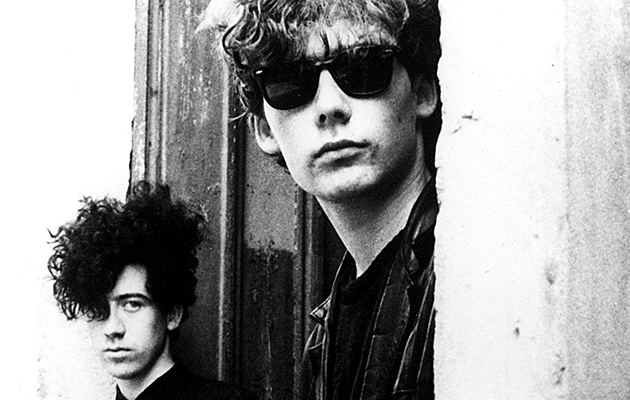Thirty years ago, The Jesus And Mary Chain were smashing up paint factories on acid and plotting their career in an East Kilbride bedroom. Soon, there would be riotous gigs, startling records, leather trousers, animosities and a musical revolution born out of white noise. Now, as they recreate the m...
“In 1982, Jim and I started to develop a style,” explains William. “I know if I impressed Jim, it made my day. We were going to start two bands. We’d say, ‘Why don’t people write really catchy pop songs, and just put the most horrific noise on them?’ He’d be like, ‘My band’s going to do that’, and I’d say, ‘My band’s going to do that.’ Somewhere along the line, it clicked. Let’s be the same band.”
“William came in with the name and a bunch of other songs,” says Douglas. “So suddenly we had six or seven incredible songs, and we had to find a drummer.”
“They were quite quiet boys,” remembers Murray Dalglish, the only person to respond to the ad the Reids placed in Impulse, the town’s only record shop. “It was funny; I’d lived in East Kilbride all my life but had never seen them before. Later on, I found out they were quite insular. Then it all made sense.”
Encouraged by the demos they’d recorded with a primitive drum machine, the group began rehearsing. According to Douglas Hart, these early rehearsals were especially trying for their new drummer. “Murray played with just a floor tom and snare under a dictatorial regime. We were quite militant about it. The drum machine beats were primitive, but it suited. There were no drum fills in the demos so if someone played ’em live, it’d be like, ‘What the fuck are you doing?’ Sounds fucking shit. No cymbals, no drum fills, know what I mean?”
Meanwhile, a cassette of early versions of “Never Understand” and “Upside Down” – credited to The Daisy Chain – had been sent to a promoter at Glasgow’s Candy Club, in the hope of securing a gig. They were turned down, although the promoter passed the tape on to a friend, who he thought might enjoy the compilation of Syd Barrett material on its B-side. However, the Barrett fan – Bobby Gillespie – found himself impressed by the two original songs and, in turn, he gave the tape to his old school friend, Alan McGee. To their delight, the Reid brothers, Hart and Dalglish were invited to play their first gig at McGee’s Living Room night in London on June 8, 1984. Though the drunken gig – which also featured The Jasmine Minks and The Loft on the bill – passed off without too much incident, their first show in Glasgow two days later was a different proposition. “There was a battle of the bands at Night Moves, a hipster club, and we got on the bill,” begins Hart. “We were thrown off the stage after three minutes. We were really drunk, and rather than singing, Jim was screaming obscenities. The club owner was going, ‘Never come back!’ We were delighted by the reaction.”
“At another gig, Jim and William were pissed,” recalls Dalglish. “Jim was falling over the amps. The bouncers came onstage and we got heckled off.”
After seeing the Mary Chain play a few more shows, Alan McGee signed them to his fledgling label, Creation, in late 1984. Under the auspices of the label’s co-founder, Joe Foster, they recorded their debut single, “Upside Down”, backed with a cover of Pink Floyd’s “Vegetable Man” [see sidebar]. Although it didn’t quite capture the fuzz and feedback the Reids were aiming for, “Upside Down” nevertheless showed the synthesis of girl-group pop and lysergic garage the group were aiming for. Shortly after, the band relocated to London – and there were other changes within the band, too. The Reids had accumulated enough new original material to dispense with most of the covers they’d been playing, including The Subway Sect’s “Ambition” and Jefferson Airplane’s “Somebody To Love”. Critically, they also had a new drummer, after Dalglish left to continue his apprenticeship in coach-building. “We were great before,” says Hart. “But when Bobby joined, it completed the picture. McGee put us on a Creation tour of Germany. Bobby always says that I said to him, ‘We’re all gonna get leather trousers like The Beatles, and we’re gonna come back pop stars.’ And basically that’s what happened! When we got back, ‘Upside Down’ had been released, and we were on the cover of every paper.”



